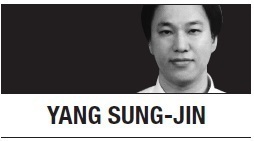[Digital Simplicity] Spotify’s deal with Kakao offers a positive signal
By Yang Sung-jinPublished : March 13, 2021 - 16:01

The debacle stemmed from the fight between Kakao Entertainment, which controls about 40 percent of the domestic music service market, and Spotify, the worlds’ biggest streaming music provider.
Speculation mounted over why they failed to reach a deal. One theory is that Kakao Entertainment, which runs the country’s biggest streaming service, Melon, wanted to protect its dominant position against a potentially formidable foreign rival.
It’s not a far-fetched speculation. Back in 2016 when Apple launched its music streaming service, it did not sign a licensing deal with Kakao, which in turn offered a convincing reason to continue the subscription for Melon through which users could listen to local music.
On Thursday, however, the conflict came to an abrupt end. The two companies said they have renewed a contract that would restore the library of K-pop in Spotify in and outside of Korea.
This is good for music fans, but the questions remain. What was the specific reason behind the initial conflict between the two companies and how did they end up reaching a deal? Did global K-pop fans’ reaction play a role in prompting the two firms to make some compromise? More importantly, will Kakao Entertainment get more money from Spotify?
Interestingly, Korean media are reporting that Spotify has emerged as a winner in its fight with Kakao Entertainment. But specific terms for the new contract are sealed, and it is unlikely that either of the two would reveal what had really happened, much less providing the details about the contract.
What is puzzling for me is the degree of the media attention generated by the initial confrontation and eventual compromise between Kakao Entertainment and Spotify.
Given that Korean streaming music providers and Apple offer monthly subscription priced at 8,000-9,000 won, Spotify, whose standard service for a single account is set at 10,900 won, is unlikely to make an immediate impact on the local market. In fact, Spotify’s market share is estimated at a mere 0.5 percent, even though it is now conducting a promotional campaign that allows Korean users to toy with the service for three months free-of-charge.
Many digital music users are highly sensitive to subscription fees, and the 10,900-won tag clearly appears higher than the conventional level.
Digital music apps are now an essential part of the smartphones, laptops and desktop computers for mainstream music fans. Even though the shift from the physical album to digital format is dramatic, the majority of music fans have adapted themselves to the new environment in which they listen to their favorite songs as well as playlists of new songs mixed and sorted by artificial intelligence solutions and music experts.
Sometimes, I find myself missing the physical senses associated with music albums that I had bought years ago. Although the digital library is more efficient and streamlined in many aspects, the tactile aspect of CDs is something that cannot be matched with the screenshots displayed on my computer screen.
Of course, this is an outdated concept, and mainstream music fans do not care about these elements any longer. Speed and ease of use are appreciated, which cannot be reversed. In this regard, Melon, Spotify and other streaming apps are the very important gateways for opening up a musical world for many of music fans.
It is hoped that the entry of Spotify would help fans of Korean music here and elsewhere enjoy K-pop, instead of creating a turf war that limits choice.
By Yang Sung-jin (insight@heraldcorp.com)
Yang Sung-jin is the multimedia editor of The Korea Herald. -- Ed.












![[Today’s K-pop] BTS pop-up event to come to Seoul](http://res.heraldm.com/phpwas/restmb_idxmake.php?idx=644&simg=/content/image/2024/04/17/20240417050734_0.jpg&u=)





![[KH Explains] Hyundai's full hybrid edge to pay off amid slow transition to pure EVs](http://res.heraldm.com/phpwas/restmb_idxmake.php?idx=652&simg=/content/image/2024/04/18/20240418050645_0.jpg&u=20240419100350)

![[Today’s K-pop] Zico drops snippet of collaboration with Jennie](http://res.heraldm.com/phpwas/restmb_idxmake.php?idx=642&simg=/content/image/2024/04/18/20240418050702_0.jpg&u=)